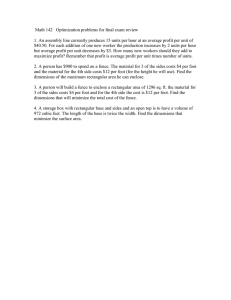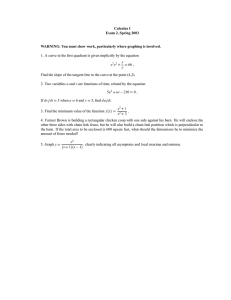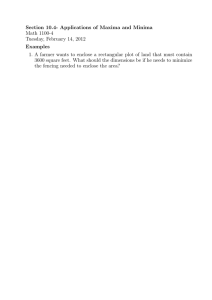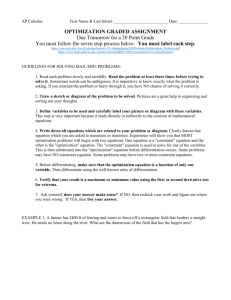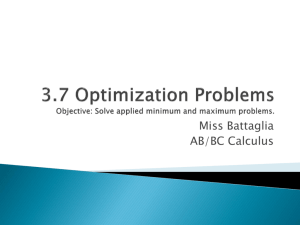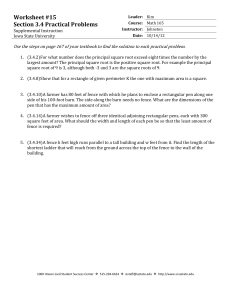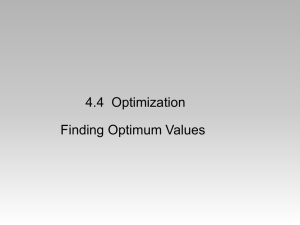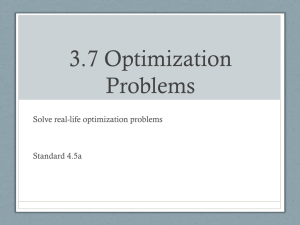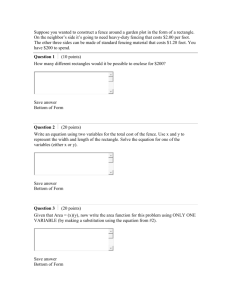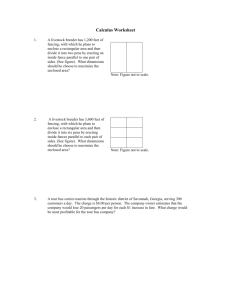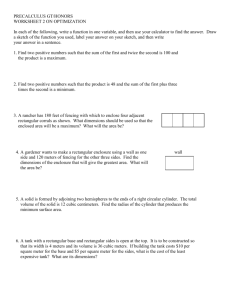Optimization - Monmouth Regional High School
advertisement
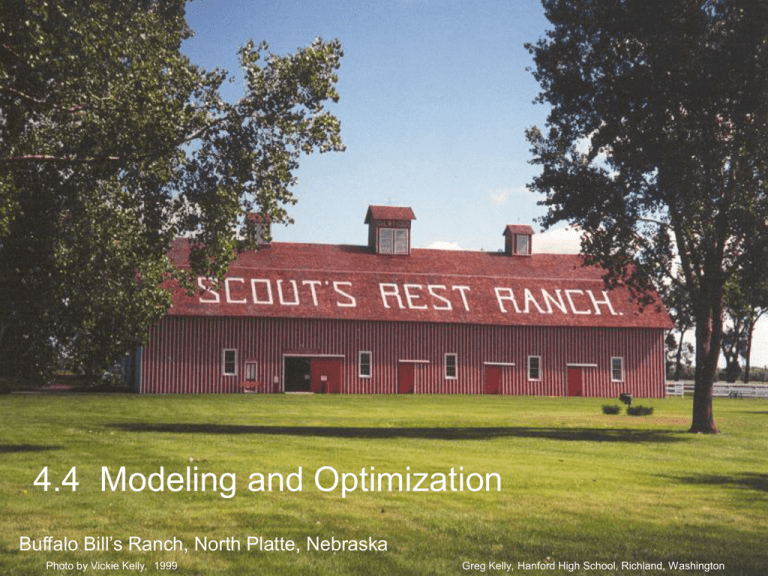
4.4 Modeling and Optimization Buffalo Bill’s Ranch, North Platte, Nebraska Photo by Vickie Kelly, 1999 Greg Kelly, Hanford High School, Richland, Washington Optimization • Applying Calculus and its methods for finding minimums and maximums in real life situations such as What is the largest area I can enclose with a given amount of fence? What is the least amount of material needed to build a cylinder of given volume? What dimensions will maximize the volume of a rectangular prism with given surface area? A Classic Problem You have 40 feet of fence to enclose a rectangular garden along the side of a barn. What is the maximum area that you can enclose? A x 40 2 x A 40 x 2 x x x 40 2 x wx l 40 2 x w 1 0 ft l 2 0 ft A 40 4 x 0 40 4 x 4 x 40 x 10 2 There must be a local maximum here, since the endpoints are minimums. (and the function is a downward parabola) A Classic Problem You have 40 feet of fence to enclose a rectangular garden along the side of a barn. What is the maximum area that you can enclose? A x 40 2 x A 40 x 2 x x x 40 2 x wx l 40 2 x w 1 0 ft l 2 0 ft A 40 4 x 0 40 4 x 4 x 40 x 10 2 A 1 0 4 0 2 1 0 A 10 20 A 200 ft 2 General procedures for finding solutions to optimization problems: 1 Draw a picture and appropriately label the important parts. 2. Write an equation (function) for the quantity you want to optimize in terms of one variable. 3 Find and test all critical numbers. (answers are usually fairly obvious.) What is the largest open top box I can make by cutting squares from each corner of a 6 by 6 sheet of metal? V(x) = x(6 - 2x)(6 - 2x) = 36x – 24x2 + 4x3 V’(x) = 36 – 48x + 12x2 V(x) = x(6 - 2x)(6 - 2x) 12x2 – 48x + 36 = 0 V(1) = (1)(6 - 2)(6 - 2) x2 – 4x + 3 = 0 (x – 3)(x – 1) = 0 x = 3 or x = 1 V(1) = 16 cubic units Example 5: What dimensions for a one liter cylindrical can will use the least amount of material? We can minimize the material by minimizing the surface area. 2 We need another A 2 r 2 rh equation that relates r and h: area of ends V r h lateral area 2 1 L 1000 cm 1000 r h 2 A 2 r 2 r 2 3 A 2 r 2 10 0 0 r 2000 r 1000 r 2 h A 4 r 2000 r 2 2 Example 5: What dimensions for a one liter cylindrical can will use the least amount of material? A 2 r 2 rh V r h 2 2 1 L 1000 cm 3 1000 r h area of ends lateral area 2 1000 r 2 2000 A 2 r 2 r 2 h A 2 r 2 r 10 0 0 r 4 r 2 2000 4 r 3 2 500 2000 r 3 r 1000 5.42 2 h h 1 0 .8 3 cm A 4 r 2000 r 0 4 r 2 2000 r r 3 500 r 5 .4 2 cm 2 To summarize: Write a function for the amount that you want to optimize. If the function that you want to optimize has more than one variable, use substitution to rewrite the function. If you are not sure that the extreme you’ve found is a maximum or a minimum, you have to check. If the end points could be the maximum or minimum, you have to check. (This is rare)
